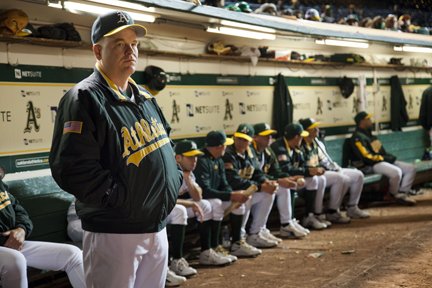
In honor of the Academy Awards, which aired last Sunday, I watched one of the films nominated for best picture. “Moneyball” lost out to the black-and-white silent film “The Artist” for both the best picture and lead actor categories, but it is still one to watch.
For me, the film deserves the best picture nomination because it took two subjects that are of little interest to me – baseball and statistics – and somehow made it into a compelling story.
Director Bennett Miller did a great job of creating tension throughout the film between his main character Billy Beane (played by Brad Pitt) and the rest of the cast. Some of the credit surely goes to the screenwriters Steve Zaillian and Aaron Sorkin, who wrote a screenplay based on the book by Michael Lewis.
This is not the typical underdog overcoming a challenge sports tale that is so often seen in Hollywood. There is no World Series win at the end of this film, but that just makes it feel like the true story that it is.
Billy Beane (Pitt) is the general manager for the Oakland A’s when some of his key players are picked off by other ball clubs. Even with the hot players, the team couldn’t make it to the championship game. The owner of the team refuses to put more money into recruiting new players.
Beane has a group of advisors in the form of the board of directors and they want to keep using their tried-and-true method of recruiting young talent and molding them into good ball players. It is cost-effective, even if it hasn’t been winning them pennants.
Beane’s idea of how to build a baseball team changes when he visits another team to negotiate for a player. He meets Peter Brand (Jonah Hill), an Ivy League wiz kid who believes he can build a winning team based on a lot of statistical analysis that has nothing to do with homerun hits.
Peter’s technique includes looking at how often a player gets on base – even if it just has to do with how often they get walked. He’s not concerned about big plays or fielding. He only looks at the potential to get runs – enough runs mean a win.
When Beane goes back to his board with Brand’s data in hand, he tells the others he is hiring three players including an older guy who is past his prime, a young player with an injury and another with a reputation as a wild man. They all want to hire a young recruit again – but Beane knows that no matter how much potential a high school or college player shows, it is not a guarantee they will perform in the big leagues.
Director Miller keeps them to a minimum, but there are a few flashbacks that show Beane as a high school kid with a lot of potential. Instead of going to college, he succumbed to pressure from recruiters to take his chance with Major League Baseball. Despite a short stint at a few different teams, his career faltered and he didn’t go anywhere.
Part of Beane’s strategy depends on his head coach Art Howe (Philip Seymour Hoffman) playing the players he wants on the field. If they are sitting on the bench, the three players who need to get on base can’t do it. Howe and Beane clash throughout the movie, as Howe doesn’t buy into Beane’s philosophy. Week after week, Howe refuses to put in any of the new players, including Scott Hatteberg (Chris Pratt). The team continues to lose, with both Beane and Howe blaming the other.
While most of the movie flows together well, the scenes between Beane and his pre-teen daughter Casey (Kerris Dorsey) almost feel like they are from another movie entirely. When he is at the stadium, he always seems on the verge of throwing something – and sometimes he does throw things. He doesn’t watch the games from a luxury box, but instead spends the innings in a weight room.
But when he is with his daughter, Beane is calm and collected. He takes her to a guitar store and makes ice cream sundaes with her. The scenes hardly add to the overall film, except that Casey gives a voice to the concerns that Beane is holding in. She asks if he is going to lose his job if his team continues to lose games.
Beane eventually forces Howe to play the players he wants on the field – and Brand’s magical formula seems to be working. The movie shows that even with the right numbers, there is a little bit that is unpredictable out on the field.











